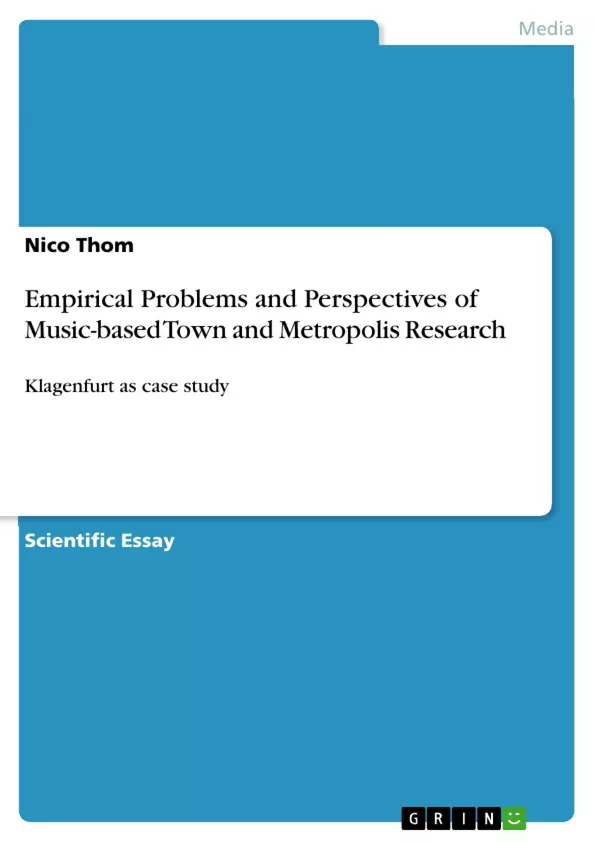The following article is intended to point up a few of the empirical-methodological problems which arose in the course of a small case study. This can at best lead to further comparable or larger studies.
As a minimum the text will have achieved its goal if it clarifies the initial thinking behind a concrete, music-based town study, i.e. if it reveals clearly the first steps to be undertaken in such a
study. Considerations of the method and of the methodology of such studies will replace a more comprehensive analysis of the data gathered in the actual case study.
Inhaltsverzeichnis (Table of Contents)
- Introduction
- Music-based approaches as an extension of general town and metropolis research
- Methodological problems
- An empirical research seminar in Klagenfurt
- Small town or big city?
- Where to draw the line(s)? – 1. The city limits
- Where to draw the line(s)? - 2. The time period for our study
- Who does the research?
- How many researchers are required?
Zielsetzung und Themenschwerpunkte (Objectives and Key Themes)
This article explores the empirical-methodological challenges encountered in a case study examining the relationship between music and urban space in the city of Klagenfurt, Austria. The goal is to highlight the complexity of capturing music-related activities within a given city, particularly focusing on the practicalities of research methods and the difficulties of achieving comprehensive data collection in a complex urban environment.
- The limitations of existing music-related urban research
- The challenges of defining and delimiting the scope of study
- The practicalities of data collection and analysis
- The impact of researcher experience and resources
- The need for a more comprehensive understanding of urban music practices
Zusammenfassung der Kapitel (Chapter Summaries)
- Introduction: This chapter introduces the case study and its objectives, outlining the need for more comprehensive and empirical research in the field of urban music studies. It also references the work of Sebastian Klotz and his insights into the potential of music-based urban research.
- Music-based approaches as an extension of general town and metropolis research: This section examines the growing interest in music-based approaches to urban research, highlighting various research methodologies and the need for a more integrated and rigorous approach to data collection and analysis.
- Methodological problems: This chapter focuses on the practical challenges of conducting music-related urban research, highlighting the difficulties of capturing the complexities of music practices within a given city and the need for a nuanced understanding of the limitations of existing research methods.
- An empirical research seminar in Klagenfurt: This section describes the practical research undertaken in Klagenfurt, Austria, within the framework of a research seminar. The aim was to simulate a case study of metropolis research and capture the musical activities of the city over a specific time period. The results were subsequently extrapolated to demonstrate the potential for larger-scale studies.
- Small town or big city?: This chapter discusses the difficulties of defining urban space, particularly in relation to population size and the role of regional, national, and international importance. It uses the example of Klagenfurt to illustrate the complexities of categorization and the need to consider multiple factors beyond simple population figures.
- Where to draw the line(s)? – 1. The city limits: This chapter explores the challenges of delimiting the scope of study in terms of geographic boundaries, referencing the work of Jürgen Friedrichs and the concept of urban conglomerations. It highlights the practical limitations of studying a vast area like Tokyo-Yokahama and the need for a more manageable approach.
- Where to draw the line(s)? - 2. The time period for our study: This section examines the challenges of defining the time period for study. It argues that the chosen timeframe for the Klagenfurt study – one month in 2008 – was necessary due to practical constraints but may not be representative of long-term musical trends. It also emphasizes the importance of considering the historical context of the city.
- Who does the research?: This chapter explores the role of researchers in urban music research, highlighting the challenges of working with student researchers who may lack experience in empirical research. It also suggests the need for larger and more experienced research teams to effectively capture the complexities of urban music practices.
- How many researchers are required?: This chapter discusses the resources needed for urban music research, highlighting the increasing number of researchers required for larger cities and metropolises. It also reinforces the need for a balance between student and professional researchers to ensure the quality and comprehensiveness of the research.
Schlüsselwörter (Keywords)
The keywords for this text include: urban music research, case study, methodology, data collection, urban space, Klagenfurt, Austria, music-related activities, empirical research, research seminar, metropolis, city limits, time period, research team.
Frequently Asked Questions
What is the focus of music-based town research?
It explores the relationship between music and urban space, aiming to capture musical activities and their impact on the city's identity and social structure.
What methodological problems occur in urban music studies?
Challenges include defining geographic city limits, choosing a representative time period for data collection, and managing the complexity of diverse musical practices in a metropolis.
Why was Klagenfurt chosen for the case study?
Klagenfurt served as a manageable urban environment for an empirical research seminar to simulate metropolis research and test data collection methods.
How does population size affect urban research definitions?
The paper discusses the difficulty of categorizing "small towns" versus "big cities," noting that regional and international importance often matters more than simple population figures.
Who should ideally conduct this type of empirical research?
The study suggests a need for balanced research teams consisting of both students and experienced professionals to ensure quality and comprehensive data analysis.
- Quote paper
- Nico Thom (Author), 2008, Empirical Problems and Perspectives of Music-based Town and Metropolis Research, Munich, GRIN Verlag, https://www.grin.com/document/162745



